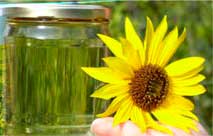CJP assesses New Nonfood Biodiesel Crops for Profitable Sustainability
CJP assesses New Nonfood Biodiesel Crops for Profitable Sustainability
With an effort to 'grow beyond oil ', apart from Jatropha, Centre For Jatropha Promotion & Biodiesel (CJP) has identified, developed and cultivated as many as 12 non-food oil crops. With years of continuing research, experiments and trials has provided an adage to find and develop 2nd generation biodiesel feedstock with low cost input technology. Among the crops identified as potential sources of biodiesel are Simmondsia chinesis, Pongamia (derris indica), Garcinia indica, Moringa oleifera, Madhuca indica, Ricinus communis, Simarouba glauca, Citrullus colocynthis, algae etc.
CJP is dedicated to the development of oil seed bearing trees - non-food multiple vegetable oil plantation and technologies in order to reduce dependence on fossil fuels, bring greater control and security of fuel supply and reduce dangerous climate changing emissions, including CO2. Global warming, greenhouse gas , food-versus-fuel, indirect land use change, deforestation-with these critical issues in the spotlight, the feedstock deficit -plagued industry badly needs less expensive feedstock in form of non-food crop like Jatropha & others. In a bid to develop new feedstocks with greater sustainability and volume, such as Jatropha and others to achieve higher sustainable production outputs to meet the growing demand, of biodiesel, CJP's R & D centre started studying and identifying some of the most cost-effective and environment-friendly nonfood biodiesel crops.
The potential of derris indicia along with moringa is also being studied in its effort to look for more viable feedstocks coupled with best available and affordable technology. There are many nonfood oil crop under field trials and experiments and after several years of research, CJP has got an improved highly yielding variety of the Derris Indica and developed enhanced crop cultivation technology with more yield and more oil .Now it is possible to have an oil yield of 330 gallon in 4th year, 1000 gallon in 7th year and 2000 gallon in 10th year from 1 ha plantation of this amazing crop and that too after leaving 70% land for other crops. Derris Indica will yield at Maturity as high as 1000 gallon oil per ha which shall reached as high as 3400 gallon in 15th year and shall be on higher side year by year up to>60 years with proper nutrition, and irrigation. This is truly an exceptional amount of oil from an agricultural crop.
Moringa oleifera is a very fast growing tree; it commonly reaches four meters in height just 10 months after the seed is planted and can bear fruit within its first year. Its pods are triangular in cross-section (30 to 50 cm long) and legume-like in appearance. These pods have oil rich black and winged seeds, which can be crushed to produce biodiesel. Moringa could yield +3 ton oil per ha and that it could be used for food in times of shortages. The seeds contain 30 percent to 40 percent oil that is high in oleic acid. The meal yields about 61 percent protein. Biodiesel made from Moringa has better oxidative stability than biodiesel made with most other feedstocks the crop's multiple dimensions would make it attractive to farmers worldwide. The Moringa oleifera tree that has enough credentials: a higher recovery and quality of oil than other crops, no direct competition with food crops as it is a edible source of fuel, and no direct competition with existing farmland as can be grown for both purpose same time
Emergence of the new crop system may change the entire scenario of the biodiesel industry and shall provide much relief to the industry which desperately in a need of a viable sustainable non-food feed stocks. Moringa oleifera, a tree known for its vitamin-rich leaves and tolerance to drought is native to India but has been used across Africa and the tropics since ancient times, it is non-invasive and no problems have been reported concerning its interaction with other plants in native ecosystems. Derris indica (Pongamia) is one of the few nitrogen fixing trees (NFTS) to produce seeds containing >40% oil. The combination of both crops may yield 1000 gallons to 2000 gallons per ha which may reach beyond 3000 gallon after maturity. The Derris Indica and moringa oleifera trees must be regarded as a sure source of 2nd Generation Biodiesel and the foundation around which a profitable Business plan can be built for their ability to provide large amount of oil and pure hardiness and stress handling ability.
CJP has already released of New Oil Crop "Moringa Cultivation Technology" and "Derris Indica Cultivation Technology" at an affordable Price
Estimates of yields, prices and cost vary greatly, making it difficult for potential growers to make informed investment decision about growing the Couple oil crop (Pongamia+ Moringa). The lack o f agronomic data about the couple oil crop (COC) growing makes it impossible to make investment decision on COC growing with the confidence and certainty associated with a decision to grow and establish a successful plantation. CJP identifies the Key elements in growing COC and their effects examined. And provide accurate information about the crop for potential COC investors and growers after performing feasibility study.
CJP'S Next 5 days Global Jatropha Hi-Tech Agricultural Training Programme October 6-10, 2009 India is all set to introduce you the real world of JATROPHA CURCAS" where the attendees shall also have the opportunity to interact with these new crops science, agronomy and its cultivation technology etc. as have also been included in the course. The registration is open.
For more information kindly contact
Director (BD)
Centre for Jatropha Promotion & Biodiesel
B-132, SAINIK BASTI, CHURU Rajasthan, INDIA-331001
TELE- (+91) 1562 255575, +91 141 2335839
FAX: (+91) 141 2335968
MOBILE- (+91) 982943333,
www.jatrophabiodiesel.org
About CJP
Centre for Jatropha Promotion & Biodiesel (CJP) India is the Global authority for scientific commercialization of Jatropha fuel crop.
CJP is dedicated to the development of oil seed bearing trees [OSBT] - non-food multiple vegetable oil plantation and technologies in order to reduce dependence on fossil fuels, bring greater control and security of fuel supply and reduce dangerous climate changing emissions, including CO2.
CJP is pioneering the science, planting and production of inedible vegetable oils by planting of a variety of tree & non-food crop plantation
CJP is engaged in scientific commercialization of non-food fuel crop- that designs and implements the growing of various oil seed bearing tree [OSBT] crops worldwide in a structured Agri-Supply chain, Value additions of inedible oil seeds and research activities thereon & provides support/services from "Soil to Oil" for development and establishment of the non -food Bio-fuel crops.
CJP use its proprietary knowledge to implement programmes through its expertise, technology and IPR knowledge creating new industry and job creation and the offsetting of climate change
Any copying and distributing the material of Ukrainian Biofuel Portal
without active hyperlink is stricly prohibited !
Copy & Paste This Code to your website:
Views: 5434 Added: 28-03-2010
Press-release provided by:Director Plantation
India
churu
Address: B-132, SAINIK BASTI
Phone: +91 141 2335839
Web-site: ce89bf5f219b310c607c402a0484edcc
 Total: 0 rates 0.00 (of 5)
Total: 0 rates 0.00 (of 5)
Images for CJP assesses New Nonfood Biodiesel Crops for Profitable Sustainability






